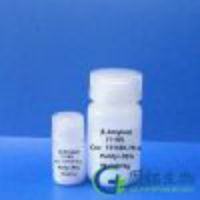Grade: Research grade
Factory Location: Hangzhou
Main Sales Markets: North America,Central/South America,Western Europe,Eastern Europe, Australasia,Asia,Middle East,Africa
Monthly Production Capacity: hundreds of grams
Packaging Information: 500mg,1g, 10g,50g 100g per package with icebag
Delivery Lead Time: In stock or 2-3 weeks
Sample Provided: yes
Payment Terms: T/T
Alzheimer's disease (AD) is a progressive and degenerative disease of the nervous system that begins insidiously. It is clinically characterized by comprehensive dementia manifestations such as memory impairment, aphasia, apraxia, loss of recognition, impaired visual space skills, executive dysfunction, and personality and behavior changes. Epidemiological studies have shown that non-steroidal anti-inflammatory drugs (cyclooxygenase inhibitors) can prevent or delay the onset of Alzheimer's disease, suggesting that brain inflammation promotes disease progression before clinical symptoms appear.β-amyloid protein and cytokines can promote the activation of inflammatory microglia cells, this process will release hydrogen peroxide, TNF-α and IL-1β killing factors. Hydrogen peroxide can promote the proliferation of microglial cells. TNF-α (tumor necrosis factor) and IL-1β (interleukin) are very powerful biologically active factors that can quickly kill diseased neurons. And the activated inflammatory microglia will exist in the neuritic plaques of Alzheimer's disease patients for a long time. The experiment found that β-amyloid, cytokines and activated microglia can strongly kill co-cultured neurons. Compared with β-Amyloid (1-42), β-Amyloid (1-40) has Better water solubility. Therefore, activating microglial cells and prompting them to kill the diseased neurons may be the ultimate treatment for such diseases.

